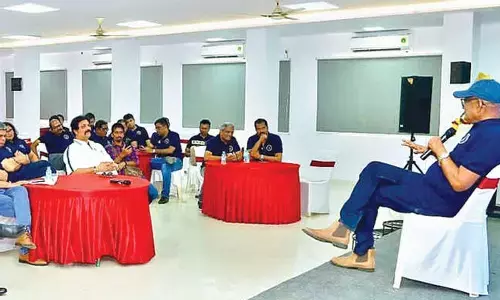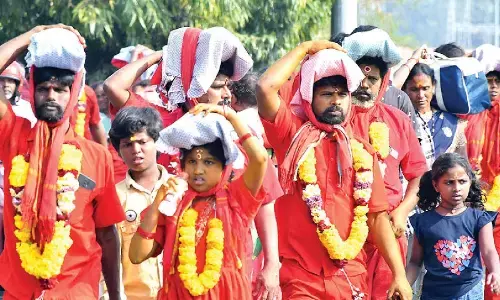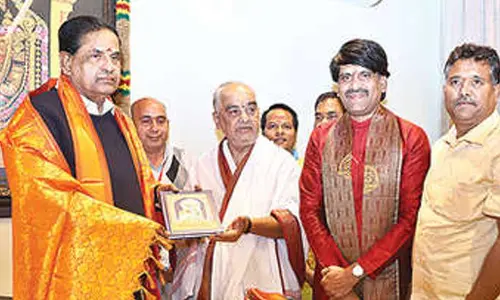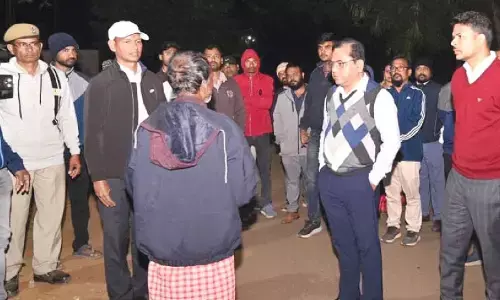Avert the looming TB-diabetes co-epidemic before it gets too late

The global picture presents a bleak scenario of the double burden of TB and diabetes, in so much as a communicable and a non-communicable disease seem to have joined hands to threaten public health. That\'s why the forthcoming first-ever Global TB Diabetes Summit in Indonesia becomes important for galvanizing effective and collaborative public health responses.
The global picture presents a bleak scenario of the double burden of TB and diabetes, in so much as a communicable and a non-communicable disease seem to have joined hands to threaten public health. That's why the forthcoming first-ever Global TB Diabetes Summit in Indonesia becomes important for galvanizing effective and collaborative public health responses.

The Global data
Diabetes: According to the latest figures of the Diabetes Atlas 2014, 387 million people were living with diabetes mellitus (DM) in 2014 and 4.9 million died of diabetes related illness. Globally 1 out of 12 person has DM (prevalence of 8.3%), and 50% of them do not know about their condition.
77% of those with DM live in low and middle income countries.
TB: As per WHO’s Global TB Report 2015, 9.6 million people fell ill with TB in 2014, and 1.5 million people died from it. Only 63% of those estimated to be having TB were notified to national TB programmes. This means that worldwide, 37% of new cases went undiagnosed or were not reported, reflecting a gap in both reporting of detected cases and access to care. Of the 9.6 million new TB cases in 2014, 58% were in the South-East Asia and Western Pacific regions.
TB and Diabetes exacerbate each other
TB and diabetes interact with each other on a number of levels. Diabetes triples a person’s risk of developing TB. Studies have found that DM in TB patients is associated with poor TB treatment outcomes--possible delay in sputum culture conversion-- increased risk of TB treatment failure/TB related deaths and also increased risk of recurrence of TB after successful treatment.
TB, on the other hand, can temporarily increase the level of blood sugar, which is a risk factor for developing DM. Moreover, some drugs used to treat TB (especially rifampicin) can make it more difficult to control diabetes due to the way that they interact with oral diabetes medications. There are growing concerns that oral diabetes medicines can decrease the effectiveness of TB medicines.
Recent studies have shown that 16%--46% of people living with TB also have diabetes, and many are unaware of it. With an estimated 9.6 million cases of TB each year, the convergence of the two diseases threatens to become a major public health crisis.
Why should india be concerned about TB and Diabetes?
India is now facing a huge double burden of these two diseases. It has both-- the largest number of TB patients in the world and the second largest number of DM cases. Hence the associated link between TB and DM is a matter of growing concern for India. In 2014 there were 2.5 million prevalent TB cases (23% of the global cases), and 0.2 million TB deaths (excluding those with HIV also). In the same year there were 66.8 million Indians living with diabetes (17% of the world cases).
In a recent webinar hosted by CNS (Citizen News Service), Dr KS Sachdeva, Additional Deputy Director General (TB), Central TB Division, Ministry of Health and Family Welfare, Government of India, spoke about the need to intensify TB-DM collaborative activities in public healthcare programmes as several studies have indicated a 13% concordance of TB-DM (Webinar recording is online at: https://www.youtube.com/watch?v=M6fONxjPhv0 ).
He informed that the TB-DM Collaborative framework developed by India is already been implemented in 100 districts and will soon be expanded to 180 districts where NPCDCS programme is currently operational. The main objectives of this framework are:
- To establish mechanisms of collaboration between NPCDCS and RNTCP for addressing co-existing TB and DM comorbidity
- To improve screening and detection of active TB cases in patients registered at NCD clinic and manage appropriately
- To intensify early screening and diagnosis of DM in registered TB patients and manage appropriately
- To establish surveillance, monitoring and evaluation mechanism
The programme involves (i) screening of all registered TB patients for DM, to ensure DM management among TB patients; and (ii) intensified detection of active TB disease among DM patients, to ensure TB treatment and management in comorbid patients and also to ensure TB infection control measures in health care settings where DM is managed.
Dr Anthony D Harries, Director of Department of Research, International Union Against Tuberculosis and Lung Disease (The Union) rightly said that, “DM is no longer a disease of rich countries and no longer a minor problem in LMIC where TB is prevalent. Rapidly growing pandemic of diabetes could threaten TB control by increasing the number of TB cases; increasing case fatality, and increasing the risk of failure of treatment or relapse of the disease.”
He called for better implementation of the Global framework for collaborative activities at country level. Peripheral clinics need to have integrated DM/TB facilities”.
First-Ever Global TB Diabetes Summit
Health officials from the governments of Indonesia, along with advocates, civil society groups, researchers and businesses from Asia, Europe, Latin America and North America are currently meeting in Bali, at the world’s first International Summit on TB and diabetes, jointly organized by The Union and World Diabetes Foundation, in an effort to avert a global health crisis.
Shobha Shukla, CNS (Citizen News Service)
Next Story




















